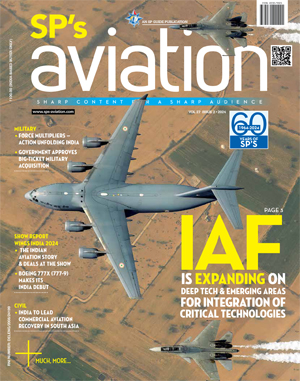INDIAN ARMED FORCES CHIEFS ON
OUR RELENTLESS AND FOCUSED PUBLISHING EFFORTS

SP Guide Publications puts forth a well compiled articulation of issues, pursuits and accomplishments of the Indian Army, over the years

I am confident that SP Guide Publications would continue to inform, inspire and influence.

My compliments to SP Guide Publications for informative and credible reportage on contemporary aerospace issues over the past six decades.
Introspection is the Key not Blacklisting
Blacklisting of foreign companies or cancellation of tenders, impede technological upgrade of the indigenous industry.

If the process of procurement of military hardware by the Ministry of Defence (MoD) has impacted the global aerospace and defence industry, it is only by its excruciatingly tardy pace in decision-making and frequent revelations of misdemeanour more commonly referred to as ‘Scam’. But a third dimension to the problem that has been plaguing the system for some time especially in the tenure of the Congress Government initially and later during the UPA Government, is its MoD’s penchant for ‘blacklisting’ firms literally at the drop of a hat!
The first time that defence procurement in India was traumatised was on account of the allegations of kickbacks in the procurement of artillery guns in 1986 from Swedish company Bofors. The needle of suspicion pointed in the direction of the highest echelons of governance in this country. On the other hand, although the Bofors guns were badly crippled on account of shortage of spares, the guns performed well during the war in Kargil in 1999 and erased doubts about their quality. It was only after this that the ban on the company was lifted but not without the deleterious consequences that the Indian Army had already suffered on account of the blacklisting. Against an alleged loss to the exchequer to the tune of Rs. 60 crore or so on account of the pay off, the net loss in terms of loss of value addition and denial of technology upgrade is incalculable. Similarly, the South African firm Denel that was to supply 155mm howitzers, was also blacklisted following accusations of misdemeanour in another deal pertaining to supply of rifles. On account of these sordid episodes, the Indian Army has not been able to procure replacement of the ageing Bofors guns till date as the tender has been cancelled five times.
Soon after the Bofors episode, the Indian Navy suffered a similar fate with the four submarines acquired from the German firm HDW. On account of allegations of bribery and kickbacks, the MoD blacklisted HDW preventing further inductions of submarines from the company and creating serious difficulties for the Indian Navy in respect of the maintenance of the four vessels already in the fleet. The Indian Navy had no option but to obtain spares at exorbitant prices and that too from vendors of dubious repute.
In 2012, on recommendations by the Central Bureau of Investigation (CBI), the MoD decided to debar six firms namely Singapore Technologies, Israel Military Industries, Rheinmetall Air Defence, Corporation Defence of Russia, TS Kisan & Co Pvt Ltd, New Delhi and RK Machine Tools Ltd, Ludhiana from further business dealings with the Ordnance Factory Board (OFB) for a period of ten years on charges of payment of illegal gratification to senior functionaries.
In the last decade, the tender for 197 helicopters for the Indian Army and the Indian Air Force (IAF) has been cancelled twice when in the final stages of processing following allegations of wrongdoing. The most recent case of procurement of aircraft under the MoD’s Defence Procurement Procedure to have gone awry has been the Rs. 3,700 crore contract for the supply of 12 AgustaWestland AW101 helicopters for the IAF specifically for VVIP travel. The situation is indeed a glorified mess with the IAF already in possession of three machines without any guarantee of product support by the parent company, the exchequer having already paid 45 per cent of the value of the tender with little or no possibility of redemption and VVIPs left without a decent vehicle for their travel. All this just for allegations of kickbacks received by Indian parties whose identity is yet to be established. And like in the case of Bofors, it is not likely to be established either as the direction in which the needle of suspicion is pointing is somewhat discomforting to the establishment.
As it stands, the contract with AgustaWestland has only been ‘terminated’ and the MoD has stopped short of blacklisting the company. Apparently, the decision to stop short of blacklisting the company has been taken by MoD to obviate the possibility of jeopardizing other major procurement contracts one of these being the $20-billion Rafale deal in which Finmeccanica, the parent company of AgustaWestland, has a role to play.
In the final analysis, blacklisting of foreign companies or cancellation of tenders, impede technological upgrade of the indigenous industry and impinges on the process of modernisation of the armed forces. In common parlance it is akin to shooting oneself in the foot. The answer therefore lies in separating crime from contract and dealing with the offender instead of punishing the company and consequently the armed forces.





